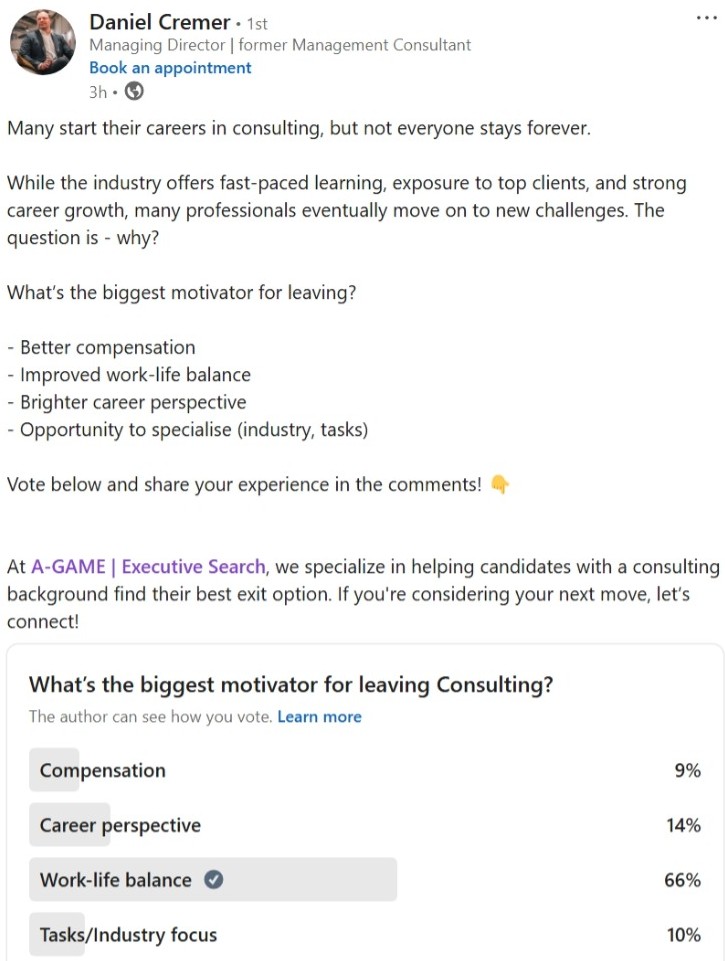Why Do So Many Professionals Leave Consulting?
For many ambitious professionals, consulting is the ultimate launchpad. It offers fast-paced learning, exposure to high-profile clients, and rapid career progression. But despite these benefits, consulting is often seen as a stepping stone rather than a long-term career. The question is—why do so many professionals eventually leave?
Daniel Cremer
3/11/20252 min read


1. Work-Life Balance: The Breaking Point for Many
It’s no surprise that work-life balance is the most common reason for leaving consulting. With long hours, frequent travel, and high-pressure deadlines, the lifestyle can be unsustainable. Many professionals find themselves working late nights and weekends, often sacrificing personal time and well-being.
While some thrive in this high-energy environment, others seek a shift towards roles that offer more predictability and personal time—whether it’s to start a family, pursue personal interests, or simply regain a sense of normalcy.
2. Career Perspective: The Long-Term Vision
Consulting offers an incredible foundation, but the career path within the industry is not for everyone. The traditional trajectory—analyst, consultant, manager, partner—can be appealing, but many professionals realize they don’t see themselves in the consulting world long-term.
Instead, they seek roles that offer a clear, sustainable growth path in industries such as technology, finance, healthcare, or startups. Moving in-house can provide opportunities for deeper expertise, leadership roles, and long-term impact within a company rather than constantly switching between projects and clients.
3. Compensation: A Surprising Factor
While consulting pays well, especially at top firms, it doesn’t always provide the highest earning potential in the long run. Compensation is often tied to structured promotion cycles, and bonuses depend on firm performance.
Some professionals find that industry roles—especially in private equity, tech, or corporate leadership—offer not only higher base salaries but also better long-term financial incentives, including stock options, profit-sharing, and equity stakes.
4. Specialization: The Desire to Go Deep
Consulting provides broad exposure across industries and functions, but some professionals crave specialization. The constant context-switching between different industries and projects can be exhilarating, but it can also leave consultants feeling like generalists rather than experts.
Moving to an in-house role or a boutique firm focused on a specific sector (e.g., fintech, healthcare, sustainability) allows professionals to build deep expertise, take ownership of long-term projects, and develop strategic influence in a particular field.
What’s Next for Consultants Looking to Exit?
For those considering their next move, the key is clarity—understanding what you want from your career and identifying the right opportunity to match. Whether it’s better work-life balance, long-term career growth, financial rewards, or specialization, there’s no one-size-fits-all answer.
At A-GAME | Executive Search, we specialize in helping consulting professionals navigate their exit strategy and find the best opportunities tailored to their goals. If you’re ready for the next step in your career, let’s connect!
#Consulting #CareerChange #WorkLifeBalance #ExecutiveSearch #CareerGrowth #ConsultingExit #NextCareerMove #Specialization #WorkHardPlayHard
Connect
Partnering with you for exceptional leadership solutions.
contact@a-game-search.com
© 2024. All rights reserved.